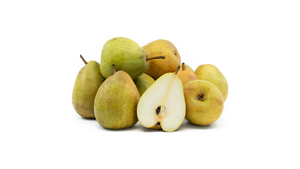
Pear
Weight
Choose options
Weight
Weight
Pears are a type of fruit that belong to the genus Pyrus. They come in different shapes, sizes, and colors, ranging from green, yellow, red, to brown. The most common varieties include Bartlett, Anjou, and Bosc. Pears are juicy, sweet, and slightly tangy, with a smooth skin and a soft, grainy texture on the inside. They are commonly eaten raw, but can also be baked, poached, or used in jams and sauces.
Health Benefits of Pears:
-
Rich in Dietary Fiber: Pears are an excellent source of fiber, particularly in the skin. A medium-sized pear contains about 6 grams of fiber, which helps support digestive health, prevent constipation, and maintain regular bowel movements.
-
Supports Heart Health: The fiber, antioxidants, and potassium in pears contribute to cardiovascular health. Fiber helps lower cholesterol levels, while potassium supports healthy blood pressure levels. Pears also contain flavonoids, compounds that may reduce the risk of heart disease by improving blood vessel function.
-
Boosts Immune System: Pears are a good source of vitamin C, which helps strengthen the immune system. Vitamin C is an antioxidant that helps protect the body against infections, supports the skin, and promotes healthy cell function.
-
Helps with Weight Management: Pears are low in calories but high in water content, making them a great option for hydration and satiety. The fiber helps control hunger by providing a feeling of fullness, which can support weight loss or maintenance.
-
Improves Skin Health: The antioxidants in pears, including vitamin C and copper, help protect the skin from free radicals and environmental stress. Vitamin C also supports collagen production, which is essential for maintaining skin elasticity and a youthful appearance.
-
Supports Gut Health: Pears contain prebiotics, which are non-digestible fibers that promote the growth of beneficial gut bacteria. A healthy gut microbiome is linked to improved digestion, stronger immunity, and better overall health.
-
Helps Prevent Chronic Diseases: The antioxidants, including flavonoids and polyphenols, found in pears have anti-inflammatory properties. Regular consumption of pears may reduce the risk of chronic diseases such as type 2 diabetes, obesity, and certain cancers.
-
Hydration: Pears have a high water content (about 84%), which helps keep you hydrated. Proper hydration is essential for maintaining bodily functions, including temperature regulation, joint lubrication, and nutrient transportation.
-
Good for Bone Health: Pears contain vitamin K and trace minerals like boron, which help improve bone health by supporting bone mineralization and strength.




